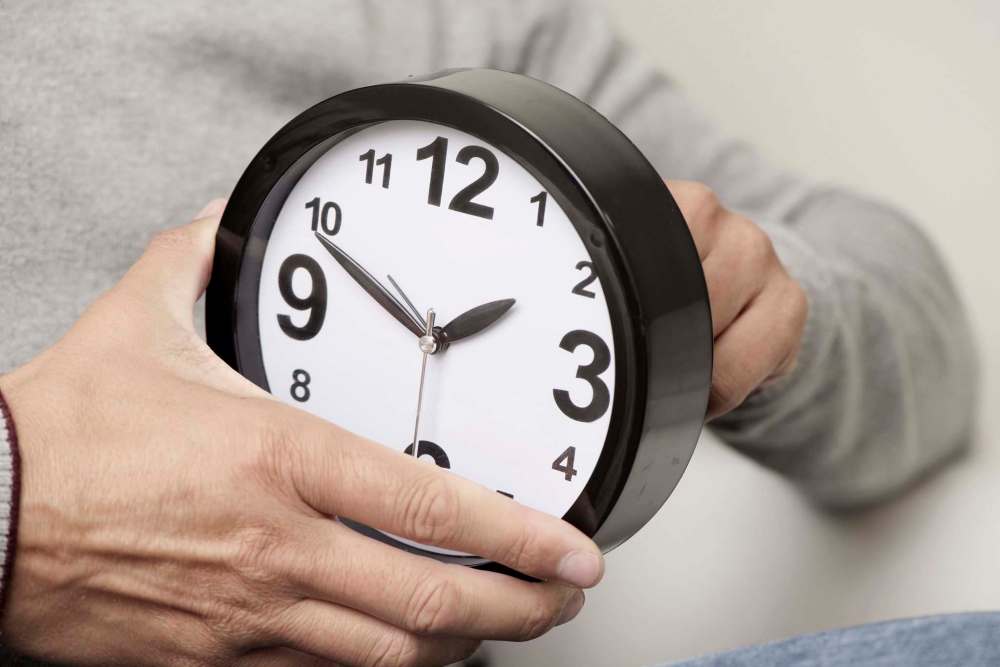Is it time for change on time change?
Read this article for free:
or
Already have an account? Log in here »
To continue reading, please subscribe:
Monthly Digital Subscription
$0 for the first 4 weeks*
- Enjoy unlimited reading on winnipegfreepress.com
- Read the E-Edition, our digital replica newspaper
- Access News Break, our award-winning app
- Play interactive puzzles
*No charge for 4 weeks then price increases to the regular rate of $19.00 plus GST every four weeks. Offer available to new and qualified returning subscribers only. Cancel any time.
Monthly Digital Subscription
$4.75/week*
- Enjoy unlimited reading on winnipegfreepress.com
- Read the E-Edition, our digital replica newspaper
- Access News Break, our award-winning app
- Play interactive puzzles
*Billed as $19 plus GST every four weeks. Cancel any time.
To continue reading, please subscribe:
Add Free Press access to your Brandon Sun subscription for only an additional
$1 for the first 4 weeks*
*Your next subscription payment will increase by $1.00 and you will be charged $16.99 plus GST for four weeks. After four weeks, your payment will increase to $23.99 plus GST every four weeks.
Read unlimited articles for free today:
or
Already have an account? Log in here »
Hey there, time traveller!
This article was published 08/01/2020 (2162 days ago), so information in it may no longer be current.
For decades, Manitobans have been giving themselves jet lag twice a year without ever having to step onto an airplane. Like many other jurisdictions, we lose an hour on the clock every spring, and gain an hour every fall.
Some people bounce back without complaint after the shift to their sleep cycles. But as University of Washington researcher Christopher Barnes showed in a 2009 study, switching our waking times often leads to sleep loss, lower alertness and cognitive function, and an increase in workplace injuries.
Informally, that drop in productivity is referred to as “Sleepy Monday” — and given that it’s the consequence of changing our clocks, not an actual seasonal variation in daylight, some argue that it’s wholly unnecessary.
In 2014, Manitoba Public Insurance showed the number of collisions the Monday after we “spring forward” was 20 per cent higher than on other Mondays
Outside the workplace, it also has effects. In 2014, Manitoba Public Insurance showed the number of collisions the Monday after we “spring forward” was 20 per cent higher than on other Mondays.
One of the rationales for having daylight saving time was to decrease the need for artificial light and save money on energy.
But north of the 49th parallel, there’s so much seasonal variation in daylight that this isn’t necessarily true. It’s going to be dark for much of the winter, and bright for much of the summer. Changing the clock is not going to affect that much.
The governing Progressive Conservatives have been given nudges to do something about the arbitrary switch back and forth, but to date none has been politically palatable.
One came in the form of a 2018 private member’s bill from independent MLA Cliff Graydon, a former Tory who had previously been removed from caucus. Mr. Graydon’s bill would have amended the Official Time Act to keep Manitoba on Central Standard Time all year.
Not surprisingly, given the outsider status of its proponent, nothing came of that proposal.
More recently, the provincial New Democratic Party launched a website and announced public consultations to consider whether Manitoba should abandon switching back and forth and, if so, which time regimen to stick with.

If such an initiative were adopted, this province would likely follow the lead of Saskatchewan, which abandoned the practice in 1966 (allowing some regional exceptions) and remains on Central Standard Time year-round.
In October, British Columbia introduced legislation to stop switching and remain on Pacific Daylight Time year-round, after public consultation showed support for the move at 93 per cent.
However, there is no date set for the change, pending consultations with the province’s trading partners in the U.S. Pacific Northwest that are also considering whether to stop changing the clocks. Premier John Horgan has stated B.C. will proceed with the change even if others don’t.
There is a rare opportunity here for the three provincial parties to co-operate on a simple resolution to a twice-yearly debate.
In Manitoba, the notion of dropping daylight saving time, coming as it does from the official Opposition, is unlikely to gain traction with the legislature. Liberal leader Dougald Lamont has previously proposed putting the question to a referendum in the 2023 provincial election.
There is a rare opportunity here for the three provincial parties to co-operate on a simple resolution to a twice-yearly debate.
The public could weigh in through the NDP’s website efforts, the choice could be put to Manitobans via referendum as recommended by the Liberals, and the Tories could commit to taking the process seriously by agreeing to respect the referendum’s result.
Getting rid of daylight saving time isn’t an issue Manitobans should lose any sleep over. But as long as we continue switching back and forth, that’s exactly what many of us will do.












